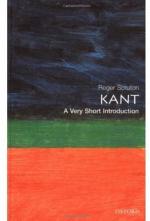|
This section contains 240 words (approx. 1 page at 400 words per page) |

|
Koenigsberg
Koenigsberg is Kant's birthplace.
University of Koenigsberg
Kant taught at the University of Koenigsberg for his entire academic career.
Rationalism
Rationalism is the philosophical school which believes the world can be known through the exercise of reason alone.
Empiricism
Empiricism is the philosophical school which denies that reason is capable of knowing the world. Rather, knowledge comes through the senses only.
Phenomena
Phenomena are the objects of experience. Their relationship to the real objects in the world is unclear, though it would seem that Kant believed they were at least representative.
Noumena
Noumena are objects in themselves. According to Kant's philosophy, it is impossible to know anything about them.
Categorical Imperative
The categorical imperative is the basis for Kantian ethics. It states that one must always act in a way that is compatible with some universal law. In other words, one must always act in a way...
|
This section contains 240 words (approx. 1 page at 400 words per page) |

|




